外研版八年级英语下册Module 6 Hobbies 教学设计
外研版英语八下Module6《Hobbies》说课稿

外研版英语八下Module 6《Hobbies》说课稿一. 教材分析《Hobbies》是外研版英语八年级下册Module 6的一篇课文,主题是关于兴趣爱好的。
通过本课的学习,学生可以了解不同人的兴趣爱好,提高口语表达能力,培养跨文化交流的意识。
本文主要介绍了一位喜欢旅游的人和他的旅行经历,以及另一位喜欢集邮的人和他的邮票收藏。
通过这篇课文,学生可以了解到兴趣爱好对人们生活的影响,以及如何与人分享自己的兴趣爱好。
二. 学情分析根据我对学生的了解,他们已经具备了一定的英语基础,能够听懂并运用一些基本的英语句型。
但是,学生在口语表达方面还存在一定的困难,尤其是在描述自己的兴趣爱好方面。
此外,部分学生可能对旅行和集邮这些话题较为陌生,需要老师在课堂上进行引导和拓展。
三. 说教学目标1.知识目标:学生能够听懂、读懂并运用本课中的关键词汇和句型,如“hobby”、“collection”、“stamp”等。
2.能力目标:学生能够用英语描述自己的兴趣爱好,并进行简单的交流。
3.情感目标:学生能够认识到兴趣爱好对生活的重要性,培养积极的生活态度。
四. 说教学重难点1.重点:学生能够掌握本课中的关键词汇和句型,并运用到实际交流中。
2.难点:学生能够用英语描述自己的兴趣爱好,并进行流畅的交流。
五. 说教学方法与手段1.交际法:通过小组讨论、角色扮演等方式,让学生在实际语境中运用所学知识。
2.任务型教学法:通过完成各种任务,激发学生的学习兴趣,提高学生的参与度。
3.多媒体辅助教学:利用图片、视频等资源,丰富教学手段,提高学生的学习兴趣。
六. 说教学过程1.导入:教师通过提问方式引导学生谈论自己的兴趣爱好,为新课学习做好铺垫。
2.新课呈现:教师展示课文图片,引导学生预测课文内容。
然后播放课文录音,让学生跟读并模仿语音语调。
3.课文讲解:教师讲解课文中的关键词汇和句型,让学生进行实际操作练习。
4.拓展活动:教师学生进行小组讨论,让学生分享自己的兴趣爱好,并用英语进行描述。
新外研版 八年级下册Moudle 6 Hobbies教案Module 6 Hobbies
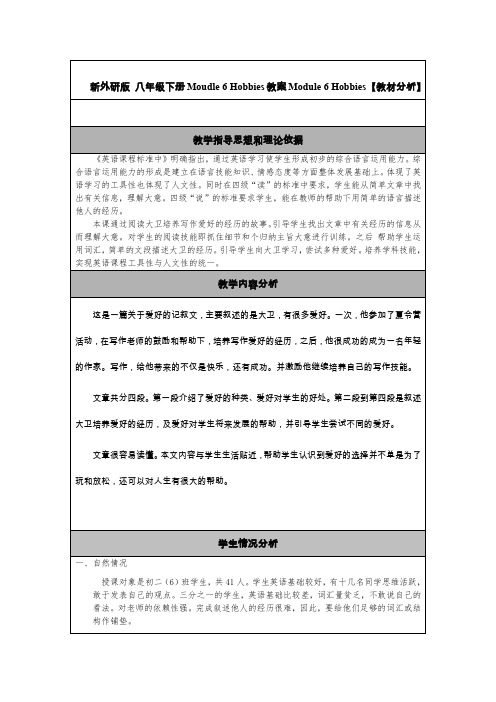
3.读后内化时,设计了三个任务,内化了单词,词组,文段。从易到难,从学生的角度出发,照顾不同层次的学生的需要,为学生顺利叙述大卫的爱好经历做好铺垫。
本课通过阅读大卫培养写作爱好的经历的故事。引导学生找出文章中有关经历的信息从而理解大意。对学生的阅读技能即抓住细节和个归纳主旨大意进行训练。之后 帮助学生运用词汇,简单的文段描述大卫的经历。引导学生向大卫学习,尝试多种爱好。培养学科技能,实现英语课程工具性与人文性的统一。
教学内容分析
这是一篇关于爱好的记叙文,主要叙述的是大卫,有很多爱好。一次,他参加了夏令营活动,在写作老师的鼓励和帮助下,培养写作爱好的经历,之后,他很成功的成为一名年轻的作家。写作,给他带来的不仅是快乐,还有成功。并激励他继续培养自己的写作技能。
教学重难点
1.重点:通过阅读,获取大卫的培养爱好的具体经历及结果的信息。
2.难点:使用develop,encourage,as well as,experience,as a result,successful等词汇说出大卫的爱好培养过程及结果。
教学流程图
教学过程
教学环节
教师活动
学生活i动
教学资源
设计意图
A. What the hobbies have brought David’s and his plans
B. Advantages( of hobbies
C. David’s experiences of writing
外研版 八年级英语初二下册Module 6 Hobbies教案
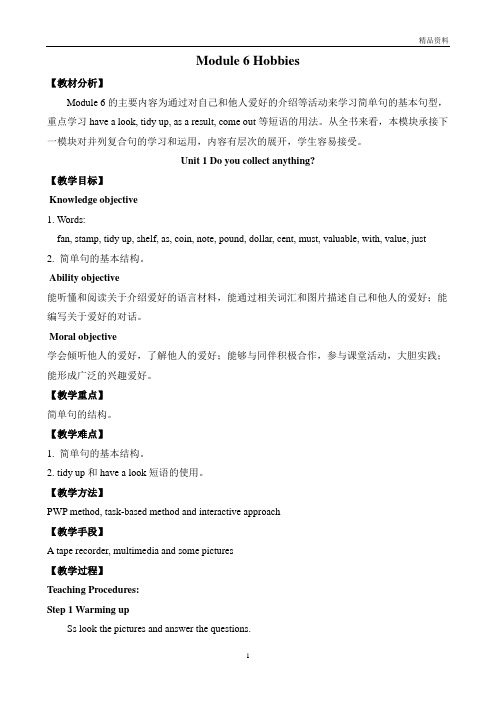
Module 6 Hobbies【教材分析】Module 6的主要内容为通过对自己和他人爱好的介绍等活动来学习简单句的基本句型,重点学习have a look, tidy up, as a result, come out等短语的用法。
从全书来看,本模块承接下一模块对并列复合句的学习和运用,内容有层次的展开,学生容易接受。
Unit 1 Do you collect anything?【教学目标】Knowledge objective1. Words:fan, stamp, tidy up, shelf, as, coin, note, pound, dollar, cent, must, valuable, with, value, just2. 简单句的基本结构。
Ability objective能听懂和阅读关于介绍爱好的语言材料,能通过相关词汇和图片描述自己和他人的爱好;能编写关于爱好的对话。
Moral objective学会倾听他人的爱好,了解他人的爱好;能够与同伴积极合作,参与课堂活动,大胆实践;能形成广泛的兴趣爱好。
【教学重点】简单句的结构。
【教学难点】1. 简单句的基本结构。
2. tidy up和have a look短语的使用。
【教学方法】PWP method, task-based method and interactive approach【教学手段】A tape recorder, multimedia and some pictures【教学过程】Teaching Procedures:Step 1 Warming upSs look the pictures and answer the questions.Step 2 New wordsLook and say. The teacher shows the pictures of new words and let the students to say as quickly as possible.fan, stamp, shelf, tidy up, have a look at, coin, note, pound, dollar, must, valuableStep 3 Listening1. Listen and find out who collects the things in the pictures.Keys: Tony: a, c Tony’s father: b, c Tony’s mum: d, e2. Answer the questions. Use the words and expression in the box to help you.1) What does Tony’s mum want him to do?2) Which hobby does Tony think is expensive?3) Which hobby do you think takes up the most space?Keys: 1) She wants him to tidy up his room.2) Tony thinks stamp-collecting is expensive.3) I think collecting toy cars takes up the most space.Step 4 Reading1. Listen to the conversation and answer the following questions.1) Where did Lingling get fans?2) Are the coins and notes valuable?Keys: 1) People often give Lingling fans as presents.2) Yes, they are.2. Read the dialogue and mark T or F.1) There are about sixty fans in Lingling’s house.2) Lingling collects British pounds and US dollars.3) Betty collects six or seven books of stamps from all over the world.Keys: T, F, T3.Now complete the notes.Lingling’s hobby: ___________________Betty’s hobbies: ____________________Tony’s hobby: ______________________Keys: 1) collecting fans2) collecting coins and notes, collecting stamps3) collecting bus and train ticketsStep 5 Everyday EnglishSorry, it’s a bit of a mess.Let me have a look.Can I see them?Right!Step 6 Language points1. Which hobby do you think takes up the most space?take up 占用,从事e.g. They take up too much space. 它们占了太多空间。
2024八年级英语下册Module6Hobbies教学设计(新版)外研版

- 角色扮演:设计角色扮演活动,模拟不同场景下的兴趣爱好交流,提高学生的语言运用能力。
3. 教学媒体使用:
- 使用多媒体课件展示兴趣爱好相关的图片、视频等,丰富教学手段,提高学生的学习兴趣。
- 利用网络资源,如英语学习网站、在线视频等,为学生提供更多真实的语言材料,增加学习资源的多样性。
3. 题目:询问他人的兴趣并给出建议
答案:What hobbies do you like?
I suggest you try playing the guitar, it's a great way to spend your free time.
4. 题目:给出理由说明为什么喜欢某个爱好
答案:I like swimming because it helps me stay fit and relaxes my mind.
- 合作学习法:通过小组合作,培养学生的团队合作能力。
- 作用与目的:
- 确保学生掌握描述爱好的英语词汇和语法。
- 提高学生的口头交际能力和团队合作能力。
3. 课后拓展应用
教师活动:
- 布置作业:设计一份作业,要求学生写一篇关于自己最喜爱的爱好的短文。
- 提供拓展资源:推荐一些英文网站和文章,供学生阅读以了解更多关于爱好的信息。
They both enjoy reading books, but Jane reads novels while Alex reads non-fiction.
板书设计
- 兴趣爱好相关的词汇:hobby, interest, collect, passion, etc.
外研版八年级下册英语《 Module 6 HobbiesUnit 3》教学设计

外研版八年级下册英语《 Module 6 HobbiesUnit 3》教学设计一. 教材分析《Module 6 Hobbies Unit 3》主要讨论了关于不同人的爱好。
本节课的主要内容包括:动词短语read books, play chess, play the guitar, watch movies等,以及形容词短语interesting, exciting, noisy, boring等。
通过本节课的学习,学生能够更好地描述自己和别人的爱好,并且能够表达出对不同爱好的看法。
二. 学情分析八年级的学生已经具备了一定的英语基础,能够听懂并运用一些基本的英语句子。
但是,对于一些复杂的动词短语和形容词短语的运用,可能还存在一定的困难。
因此,在教学过程中,需要注重引导学生正确运用这些短语,提高他们的语言运用能力。
三. 教学目标1.能够正确运用动词短语和形容词短语描述自己和别人的爱好。
2.能够听懂并能够运用本节课的主要词汇和短语。
3.能够通过本节课的学习,提高自己的语言运用能力,能够更好地表达自己的观点。
四. 教学重难点1.动词短语和形容词短语的正确运用。
2.如何引导学生更好地表达自己的观点。
五. 教学方法1.任务型教学法:通过设置不同的任务,引导学生积极参与课堂活动,提高他们的语言运用能力。
2.情境教学法:通过设置不同的情境,让学生在实际语境中运用所学知识。
六. 教学准备1.教学课件:制作相关的教学课件,帮助学生更好地理解课堂内容。
2.教学素材:准备一些与本节课相关的图片和视频,增加学生的学习兴趣。
七. 教学过程1.导入(5分钟)通过向学生展示一些与爱好相关的图片,引导学生谈论他们的爱好,从而引入本节课的主题。
2.呈现(10分钟)向学生展示本节课的主要词汇和短语,并通过例句的方式,让学生理解这些词汇和短语的用法。
3.操练(10分钟)通过不同的练习题,让学生练习使用本节课的词汇和短语,帮助他们巩固所学知识。
初级中学英语(外研版)八年级下册《Module 6 hobbies,Unit 1》教学设计
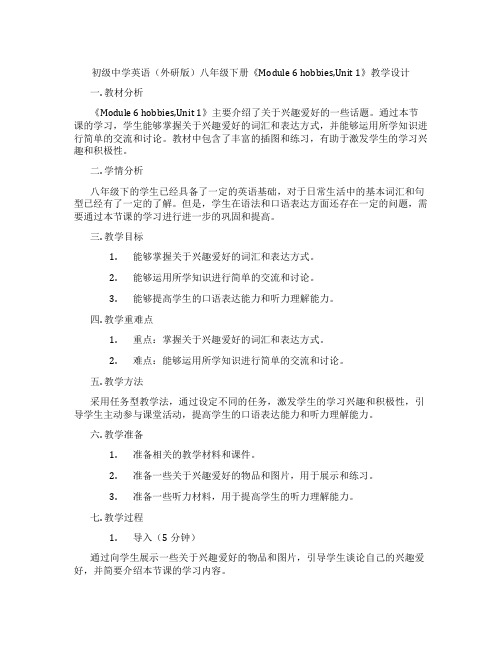
初级中学英语(外研版)八年级下册《Module 6 hobbies,Unit 1》教学设计一. 教材分析《Module 6 hobbies,Unit 1》主要介绍了关于兴趣爱好的一些话题。
通过本节课的学习,学生能够掌握关于兴趣爱好的词汇和表达方式,并能够运用所学知识进行简单的交流和讨论。
教材中包含了丰富的插图和练习,有助于激发学生的学习兴趣和积极性。
二. 学情分析八年级下的学生已经具备了一定的英语基础,对于日常生活中的基本词汇和句型已经有了一定的了解。
但是,学生在语法和口语表达方面还存在一定的问题,需要通过本节课的学习进行进一步的巩固和提高。
三. 教学目标1.能够掌握关于兴趣爱好的词汇和表达方式。
2.能够运用所学知识进行简单的交流和讨论。
3.能够提高学生的口语表达能力和听力理解能力。
四. 教学重难点1.重点:掌握关于兴趣爱好的词汇和表达方式。
2.难点:能够运用所学知识进行简单的交流和讨论。
五. 教学方法采用任务型教学法,通过设定不同的任务,激发学生的学习兴趣和积极性,引导学生主动参与课堂活动,提高学生的口语表达能力和听力理解能力。
六. 教学准备1.准备相关的教学材料和课件。
2.准备一些关于兴趣爱好的物品和图片,用于展示和练习。
3.准备一些听力材料,用于提高学生的听力理解能力。
七. 教学过程1.导入(5分钟)通过向学生展示一些关于兴趣爱好的物品和图片,引导学生谈论自己的兴趣爱好,并简要介绍本节课的学习内容。
2.呈现(10分钟)利用课件展示本节课的主要词汇和句型,同时进行翻译和解释,确保学生对所学内容的理解。
3.操练(10分钟)通过小组活动和角色扮演等方式,让学生运用所学知识进行交流和讨论,提高学生的口语表达能力和听力理解能力。
4.巩固(5分钟)通过一些练习题和游戏,让学生进一步巩固所学知识,并增强学生的学习兴趣和积极性。
5.拓展(5分钟)向学生介绍一些与兴趣爱好相关的英语学习资源,如英语电影、音乐、书籍等,鼓励学生在课后进行自主学习。
外研版八年级下册英语《 Module 6 HobbiesUnit 3》教学设计2

外研版八年级下册英语《 Module 6 HobbiesUnit 3》教学设计2一. 教材分析《Module 6 Hobbies Unit 3》主要讲述了人们对于不同爱好的介绍和交流。
本节课的主要内容是学习如何描述一个人的爱好,并能够询问和回答其他人关于他们的爱好。
教材中提供了丰富的语言材料和练习,帮助学生掌握相关词汇和句型,提高他们的口语交流能力。
二. 学情分析八年级的学生已经具备了一定的英语基础,能够进行简单的日常交流。
但是他们对于描述自己和他人的爱好还有一定的困难,因此需要通过本节课的学习,帮助他们掌握相关的词汇和句型,提高他们的口语表达能力。
三. 教学目标1.能够掌握描述爱好的相关词汇和句型。
2.能够用英语询问和回答他人关于他们的爱好。
3.提高学生的口语交流能力,培养他们积极交流的习惯。
四. 教学重难点1.重点:掌握描述爱好的相关词汇和句型。
2.难点:能够用英语询问和回答他人关于他们的爱好。
五. 教学方法1.任务型教学法:通过设定不同的任务,让学生在实际交流中运用所学知识。
2.交际法:引导学生进行真实的交流,提高他们的口语表达能力。
六. 教学准备1.教师准备相关词汇和句型的教案和课件。
2.准备一些关于爱好的图片或实物,用于展示和练习。
七. 教学过程1.导入(5分钟)教师通过提问学生关于他们的爱好,引起学生对爱好的兴趣。
例如:“What’s your favorite hobby? Why do you like it?”2.呈现(10分钟)教师展示一些关于爱好的图片或实物,如绘画、音乐、运动等,并引导学生用英语描述它们。
同时,教师呈现相关的词汇和句型,如:“I like pnting because it helps me relax.”3.操练(10分钟)教师学生进行小组活动,让他们用英语互相描述自己的爱好。
教师巡回指导,纠正学生的错误,并给予鼓励。
4.巩固(10分钟)教师设计一些练习题,让学生书面回答关于爱好的问题。
外研版英语八下Module 6《Hobbies》教学设计

外研版英语八下Module 6《Hobbies》教学设计一. 教材分析《Hobbies》是外研版英语八年级下册Module 6第三单元的内容。
本课的主题是爱好,通过介绍不同人的爱好,让学生学会表达自己的兴趣和爱好,以及询问他人的喜好。
教材包括一个听力活动、两个读写活动和一个综合语言实践活动。
本课的主要语言目标是使用一般现在时态谈论人们的爱好,并能够介绍自己和他人的兴趣。
二. 学情分析八年级的学生已经掌握了英语学习的基本语法和词汇,具备一定的听说读写能力。
他们对学习英语有着浓厚的兴趣,但在口语表达和听力方面仍有待提高。
在本课的学习中,学生需要通过听、说、读、写等多种方式,来巩固和运用所学知识。
三. 教学目标1.知识目标:学生能够掌握表示爱好的词汇,如draw, play the guitar,read等;能够用一般现在时态介绍自己和他人的爱好。
2.能力目标:学生能够在真实的语言环境中运用所学知识进行交际,提高听、说、读、写的能力。
3.情感目标:学生能够激发对英语学习的热情,培养积极向上的学习态度。
四. 教学重难点1.重点:学生能够掌握表示爱好的词汇,并用一般现在时态介绍自己和他人的爱好。
2.难点:学生能够在真实的语言环境中灵活运用所学知识进行交际。
五. 教学方法1.任务型教学法:通过完成各种任务,激发学生的学习兴趣,提高学生的参与度。
2.情境教学法:创设真实的生活情境,让学生在实际语境中学习英语。
3.交际式教学法:引导学生进行互动交流,提高学生的口语表达能力。
六. 教学准备1.教师准备:准备好教材、课件、图片、音频等教学资源。
2.学生准备:预习本课内容,了解一般现在时态的用法。
七. 教学过程1.导入(5分钟)教师通过提问方式引导学生谈论自己的爱好,如:“What do you like to do in your free time?”学生回答后,教师总结并板书关键词。
2.呈现(10分钟)教师展示教材中的图片,引导学生观察并猜测图片中人物的爱好的是什么。
外研版英语八下Module6《Hobbies》(Unit3)说课稿

外研版英语八下Module 6《Hobbies》(Unit 3)说课稿一. 教材分析外研版英语八下Module 6《Hobbies》(Unit 3)的主要内容是关于不同人的兴趣爱好。
通过本节课的学习,学生能够掌握描述个人爱好的表达方式,并能在实际情境中进行运用。
教材以丰富多样的活动形式,激发学生对英语学习的兴趣,培养他们的语言运用能力。
二. 学情分析根据八年级学生的认知特点和英语水平,他们已经具备了一定的词汇量和基本语法知识,对日常生活中的话题有较高的兴趣。
但部分学生对英语学习的积极性不高,缺乏自信心,因此,在教学过程中需要关注这部分学生的学习状态,激发他们的学习兴趣,提高他们的课堂参与度。
三. 说教学目标1.知识目标:学生能够掌握描述个人爱好的表达方式,如“Ilike/love/enjoy doing sth.”等。
2.能力目标:学生能够在实际情境中运用所学知识进行交流,提高口语表达能力。
3.情感目标:培养学生对英语学习的兴趣,增强自信心,促进团队合作。
四. 说教学重难点1.重点:学生能够运用所学知识描述个人爱好。
2.难点:学生能够在实际情境中流畅地运用所学知识进行交流。
五. 说教学方法与手段1.交际法:通过小组讨论、角色扮演等形式,让学生在实际情境中运用所学知识进行交流。
2.任务型教学法:通过完成各种任务,激发学生的学习兴趣,提高他们的参与度。
3.情境教学法:创设真实的情境,让学生在轻松愉快的氛围中学习英语。
4.利用多媒体教学手段:通过图片、音频、视频等资源,丰富教学内容,提高学生的学习兴趣。
六. 说教学过程1.导入:通过展示不同人物的图片,引导学生谈论他们的兴趣爱好,从而引入本节课的主题。
2.呈现:教师通过展示教材图片,引导学生观察并说出人物的兴趣爱好。
3.操练:学生分组进行角色扮演,练习描述个人爱好。
4.任务:学生分组完成一个关于兴趣爱好的任务,鼓励他们用所学知识进行实际交流。
5.总结:教师引导学生总结本节课所学内容,并进行情感升华。
初中英语外研八年级下册(2023年新编)Module 6 HobbiesM6U1教学设计
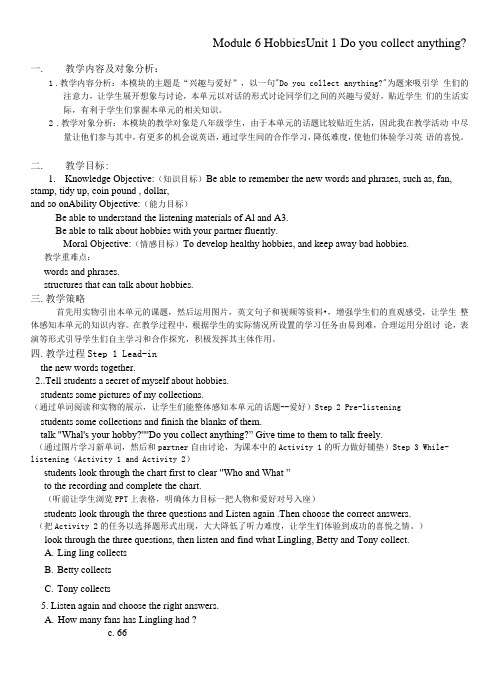
Module 6 HobbiesUnit 1 Do you collect anything?一. 教学内容及对象分析:1.教学内容分析:本模块的主题是“兴趣与爱好”,以一句"Do you collect anything?"为题来吸引学生们的注意力,让学生展开想象与讨论,本单元以对话的形式讨论同学们之间的兴趣与爱好,贴近学生们的生活实际,有利于学生们掌握本单元的相关知识。
2.教学对象分析:本模块的教学对象是八年级学生,由于本单元的话题比较贴近生活,因此我在教学活动中尽量让他们参与其中,有更多的机会说英语,通过学生间的合作学习,降低难度,使他们体验学习英语的喜悦。
二. 教学目标:1.Knowledge Objective:(知识目标)Be able to remember the new words and phrases, such as, fan, stamp, tidy up, coin pound , dollar,and so onAbility Objective:(能力目标)Be able to understand the listening materials of Al and A3.Be able to talk about hobbies with your partner fluently.Moral Objective:(情感目标)To develop healthy hobbies, and keep away bad hobbies.教学重难点:words and phrases.structures that can talk about hobbies.三.教学策略首先用实物引出本单元的课题,然后运用图片,英文句子和视频等资料•,增强学生们的直观感受,让学生整体感知本单元的知识内容。
在教学过程中,根据学生的实际情况所设置的学习任务由易到难,合理运用分组讨论,表演等形式引导学生们自主学习和合作探究,积极发挥其主体作用。
外研版英语八年级下册Module6Unit2教案

课文标题:Module 6 Hobbies单元名称:Unit 2 Hobbies can make you grow as a person.一、整体设计思路1、本课谈论的是爱好,这一话题贴近学生生活,应该会受到学生的喜爱。
本节课以一个中学生——戴维的爱好为主线,课文首先总体介绍爱好给人们带来的益处,然后具体介绍戴维如何开始选择写作作为自己的爱好,以及这项爱好给他带来的益处,最后以戴维对自己未来的设想来结束全局。
这是典型的“总分式”的英文写作方式。
在教授此课时,引导学生通过观察问题理解文章结构,弄清段落之间的逻辑关系。
2、本节课采用任务型阅读教学模式,在课堂上教学中创设接近真实的交际的情景并多采用小组活动的方式,使学生学以致用,利用思维导图的形式,最终使学生对所学内容进行建构。
1.知识目标(1)话题:谈论爱好(Hobbies)(2)词汇:掌握下列单词,词组的基本含义以及在特定语境中的意义:person, interest, skill, activity, sailing, come out, as a result, pleasure, success(3) 语法:理解六种基本句型,在大量的语言输入中感知六种句型的构成和语意功能2. 技能目标能够读懂关于爱好的文章并提取信息,能理解事件发生的顺序,能正确使用as well as, such as, as a result等介绍同学的爱好,能通过询问了解同学的爱好,并能参考所学文章结构介绍同学的爱好。
3. 学习策略认知策略: 按要求预习课文并进行拓展。
能根据阅读材料的题材和要求来选择不同的阅读技巧和方法。
合作学习策略:能够与同学合作完成有关爱好话题的讨论,增强合作意识。
4.文化意识通过学习,了解不同民族的人有着不同的爱好,从而培养学生的文化意识。
5. 情感态度通过谈论爱好,引导学生培养良好的兴趣爱好,促进学生的全面发展。
三.教学重点与难点1. 重点:掌握核心词汇和核心句型的用法:person, interest, skill, activity, sailing, come out, as a result, pleasure, success,such as, as well as2. 难点:能准确快速地应用泛读获取大意,应用精读获取细节,并能发现掌握文中的写作模式,即“总—分-总”写作模式。
外研版英语(新标准)八年级下册《Module 6 Hobbies》教案设计

通过谈论爱好,引导学生培养良好的兴趣爱好,促进学生的全面发展
学习策略:
自学策略:能够充分利用自己的爱好促进英语学习
合作学习策略:能够与同学合作完成有关爱好的调查,增强合作意识,掌握合作技能
文化意识:
通过学习,了解不同民族的人有着不同的爱好,这与其不同的历史和文化有关,从而培养学生的文化意识
2.完成Activity 2练习——听录音材料并回答问题。
训练学生听的能力,导入话题,激发学生兴趣,同时为学习对话提供背景知识和词汇铺垫。
第四步:
听和读
1.观看对话视频并完成表格。
Lingling’s hobby:
Betty’s hobby:
Tony’s hobby:
2.听读对话,模仿对话中的语音语调。
1.What’s your hobby?
2.Why do you enjoy your hobby?
3.When did you start doing it?
4. How often do you…?
5. Where do you…?
对本课的话题、重点词汇、句型进行训练,做到学以致用。
课堂评价
请将你能做到的内容在括号内打“√”。
3.三解疑惑(探究式问与答活动):让学生尝试用“what/ when/ why”提出更多关于课文的问题,并鼓励学生自己解答。
4.赏析文章:三读文章,让学生关注“as well as, such as, as a result”的表达方法,并改写Activity 6句子。
“一读大意”:教师指导学生快速阅读课文,让学生初步了解文章的大意和段落结构。
教学重点及难点
正确掌握六种简单句的句型结构
教学辅助
外研版英语八下《Module 6 Hobbies Unit 2》教学设计

外研版英语八下《Module 6 Hobbies Unit 2》教学设计一. 教材分析外研版英语八下《Module 6 Hobbies Unit 2》的主要内容包括:听力、口语、阅读和写作部分。
本节课的主要话题是关于人们的爱好,通过本节课的学习,学生能够掌握关于爱好的相关词汇和表达方式,提高他们的口语交际能力。
二. 学情分析通过前几模块的学习,学生已经掌握了一定的英语基础知识,能够进行简单的听、说、读、写操作。
但部分学生在口语表达方面还存在一定的困难,需要教师在课堂上多加引导和鼓励。
此外,学生对于描述自己和他人的爱好兴趣较为感兴趣,教师可以抓住这一点,激发学生的学习积极性。
三. 教学目标1.知识目标:学生能够掌握本节课的生词和短语,理解文章大意,提高阅读理解能力。
2.能力目标:通过听力、口语、阅读和写作的训练,提高学生的综合语言运用能力。
3.情感目标:引导学生树立正确的兴趣爱好,培养积极的生活态度。
四. 教学重难点1.重点:学生能够掌握本节课的生词和短语,正确运用所学知识进行口语表达。
2.难点:学生能够熟练运用所学知识,描述自己和他人的爱好,并进行适当的交流。
五. 教学方法1.任务型教学法:通过设置各种任务,激发学生的学习兴趣,提高他们的参与度。
2.交际型教学法:注重师生之间的互动,鼓励学生大胆开口,提高口语表达能力。
3.情境教学法:创设各种情境,让学生在真实的环境中感受和学习英语。
六. 教学准备1.教师准备:提前准备好本节课所需的教学材料,如PPT、单词卡片、听力材料等。
2.学生准备:提前预习本节课的生词和短语,了解文章大意。
七. 教学过程1.导入(5分钟)教师通过提问方式引导学生谈论自己的爱好,如:“What’s your hobby?”, “Do you like playing sports?”等。
然后引入本节课的主题:“Today, let’s talk about hobbies.”2.呈现(10分钟)教师通过PPT展示本节课的生词和短语,如:“pnting”, “cooking”, “gardening”等,并让学生跟读。
外研版英语八年级下册教案:Module6HobbiesUnit3Languageinuse
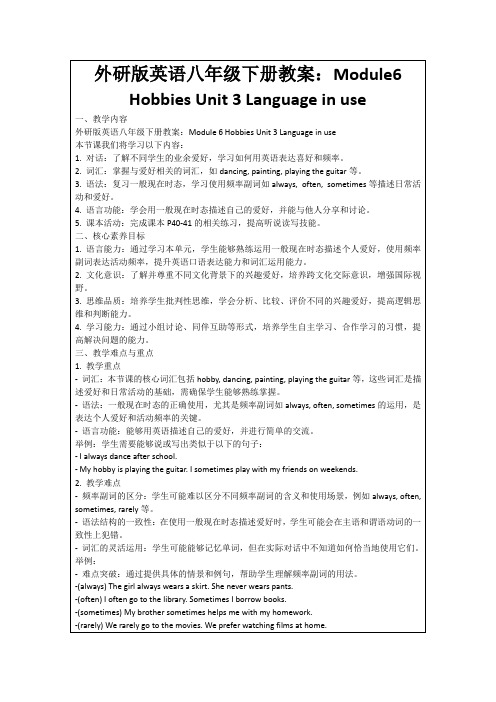
1.理论介绍:首先,我们要了解一般现在时态和频率副词在描述爱好中的基本概念。一般现在时态用于描述习惯性的动作或状态,而频率副词则用来表示动作发生的频率。
2.案例分析:接下来,我们来看一个具体的对话案例。这个案例展示了如何在实际对话中使用一般现在时态和频率副词来表达个人爱好。
外研版英语八年级下册教案:Module6 Hobbies Unit 3 Language in use
一、教学内容
外研版英语八年级下册教案:Module 6 Hobbies Unit 3 Language in use
本节课我们将学习以下内容:
1.对话:了解不同学生的业余爱好,学习如何用英语表达喜好和频率。
举例:
-难点突破:通过提供具体的情景和例句,帮助学生理解频率副词的用法。
-(always) The girl always wears a skirt. She never wears pants.
-(often) I often go to the library. Sometimes I borrow books.
-语法:一般现在时态的正确使用,尤其是频率副词如always, often, sometimes的运用,是表达个人爱好和活动频率的关键。
-语言功能:能够用英语描述自己的爱好,并进行简单的交流。
举例:学生需要能够说或写出类似于以下的句子:
- I always dance after school.
- My hobby is playing the guitar. I sometimes play with my friends on weekends.
3.重点难点解析:在讲授过程中,我会特别强调一般现在时态的动词形式和频率副词如always, often, sometimes的正确使用。对于难点部分,我会通过举例和比较来帮助大家理解。
外研版八年级英语下Module 6 Hobbies教案设计
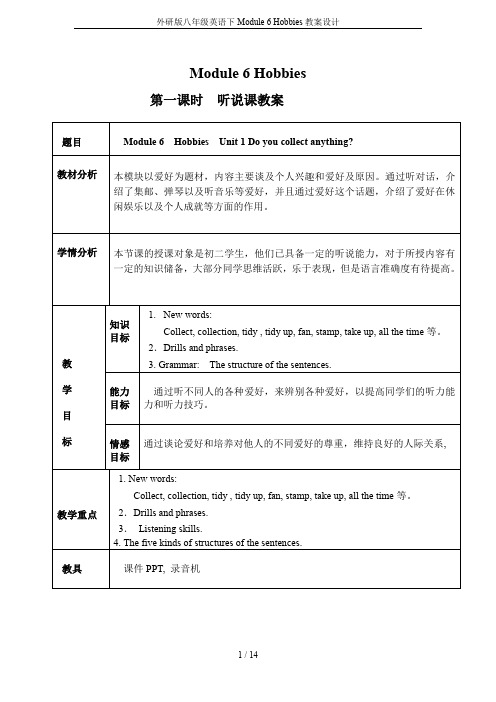
通过听力训练,提高同学们的听力能力,能准确的听辨不同人的爱好。并且通过和自己的爱好进行比较,进行说的训练。
教师
活动
Step 4:
Lead in another listening.
T: Class, you have known the hobbies about Tony’s family, do you want to know the hobbies about Tony’s friends’?
While-
listening
教师
活动
Step 3:
Lead in the listening and show them the questions, then let them compare the hobbies with their hobbies:
T: Now, class, I know your hobbies, but do you want to know Tony’s hobbies?
Try to retell the dialogue.
目的
通过朗读对话,寻找含有他们爱好的句子,读熟。
再读对话,尝试复述对话。练习读说能力。
教师
活动
Step 6:Group work
Lead the students to talk about their classmates’ hobbies, and have an activity “I am a reporter”.
T: What is your hobby? / What do you like?
S: …..
T: Why do you enjoy your hobby?
S:….
【外研版】八年级英语下册Module6Hobbies教案
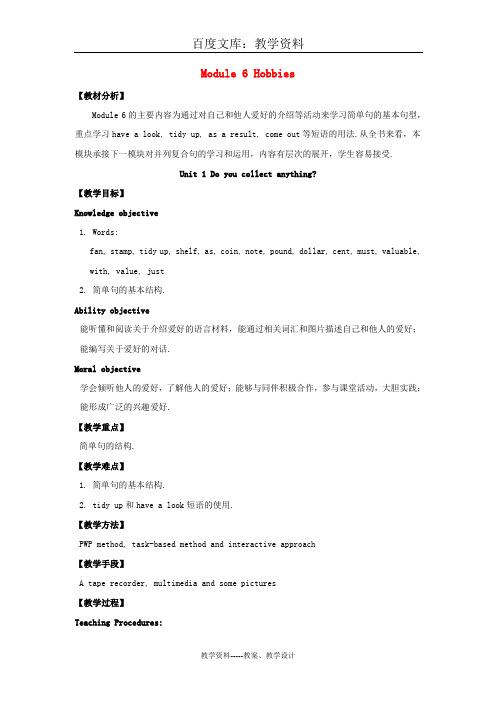
Module 6 Hobbies【教材分析】Module 6的主要内容为通过对自己和他人爱好的介绍等活动来学习简单句的基本句型,重点学习have a look, tidy up, as a result, come out等短语的用法.从全书来看,本模块承接下一模块对并列复合句的学习和运用,内容有层次的展开,学生容易接受.Unit 1 Do you collect anything?【教学目标】Knowledge objective1. Words:fan, stamp, tidy up, shelf, as, coin, note, pound, dollar, cent, must, valuable, with, value, just2. 简单句的基本结构.Ability objective能听懂和阅读关于介绍爱好的语言材料,能通过相关词汇和图片描述自己和他人的爱好;能编写关于爱好的对话.Moral objective学会倾听他人的爱好,了解他人的爱好;能够与同伴积极合作,参与课堂活动,大胆实践;能形成广泛的兴趣爱好.【教学重点】简单句的结构.【教学难点】1. 简单句的基本结构.2. tidy up和have a look短语的使用.【教学方法】PWP method, task-based method and interactive approach【教学手段】A tape recorder, multimedia and some pictures【教学过程】Teaching Procedures:Step 1 Warming upTalking about hobby.Step 2 New wordsLook and say. The teacher shows the pictures of new words and let the students to say as quickly as possible.fan, stamp, shelf, tidy up, have a look at, coin, note, pound, dollar, must, valuableStep 3 Listening1. Listen and find out who collects the things in the pictures.Keys: Tony: a, c Tony’s father: b, c Tony’s mum: d, e2. Answer the questions. Use the words and expression in the box to help you.1) What does Tony’s mum want him to do?2) Which hobby does Tony think is expensive?3) Which hobby do you think takes up the most space?Keys: 1) She wants him to tidy up his room.2) Tony thinks stamp-collecting is expensive.3) I think collecting toy cars takes up the most space.Step 4 listen and read1. Listen to the conversation and answer the questions.1) Where did Lingling get fans?2) Are the coins and notes valuable?Keys: 1) People often give Lingling fans as presents.2) Yes, they are.2. Read the dialogue and mark T or F.1) There are about sixty fans in Lingling’s house.2) Lingling collects British pounds and US dollars.3) Betty collects six or seven books of stamps from all over the world. Keys: T, F, T3.Now complete the notes.Lingling’s hobby: ___________________Betty’s hobbies: ____________________Tony’s hobby: ______________________Keys: 1) collecting fans2) collecting coins and notes, collecting stamps3) collecting bus and train ticketsStep 5 Complete the passage with the correct form of the words in the boxMany people collect things, like postcards and toys. They like to put them (1) __________ special to look at. Lingling collects fans and keeps them on a (2) ____ in her bedroom. Betty collects (3) _____ and notes, such as British (4) ______ and US (5) ______. She also collects stamps from all over the world. Tony collects tickets, but Betty thinks that you cannot do anything with old tickets. Lingling thinks that people also enjoy collecting things to (6) _________ something important in their lives.Keys: somewhere, shelf, coins, pounds, dollars, rememberStep 6 Everyday EnglishSorry, it’s a bit of a mess.Let me have a look.Can I see them?Right!Step 7 Pronunciation and speaking1.Listen and notice the intonation.Let me have a look.Do you collect anything?Yes, I collect coins and notes.Can I see them?2.Now listen again and repeat.Step 8 Pair workAsk and answer the questions about your hobbies in pairs.1What’s your hobby?2Why do you enjoy your hobby?3When did you start doing it?4How often do you …?5Where do you …?Step 9 Language points1. Which hobby do you think takes up the most space?take up 占用,从事e.g. They take up too much space. 它们占了太多空间.He decided to take up journalism. 他决定从事新闻业.2. Let me have a look.have a look 看一看,后面不加名词.have a look at sth. 看……, 后加宾语.e.g. You’d better go to the factory and have a look. 你最好到厂里去看一看. Let me have a look at the map. 让我看看这张地图.3. People often give me fans as presents because they know I like them.as prep.作为,当e.g. The foreigner will come to our home as a guest.那个外国人将会作为客人来我们家.4. They must be very valuable.must 一定,肯定,用于表示某事可能是真实的.must be 必定是,用于表示确切判断.e.g. In England traffic must keep to the left. 在英国,车辆必须靠左行驶. He must be an honest boy. 他肯定是一个诚实的孩子.5. My hobby doesn’t cost as much as yours.as … as 和……一样……e.g. His fans are as valuable as yours. 他的扇子和你的一样有价值.6. Their value isn’t always i mportant.value n.价值;有用性valuable adj.值钱的;有价值的e.g. This book will be of great value to him in his study.这本书将对他的研究有很大价值.This painting is very valuable. 这幅绘画非常名贵.Step 10 Grammar简单句的基本结构英语是一种结构型的语言,动词在句型构成中起着重要作用.英语的句子以谓语为中心,前面是动作的执行者(被动语态除外),后面接动作的承受者.1.主语+系动词+表语(+状语)2. 主语+谓语(不及物动词)(+状语)3.(状语+)主语+谓(及物动词+宾(+状语)Step 11 Exercises1. Your room is a bit of a mess. Please ___ now.A. tidy up itB. tidy it upC. take up itD. take it up2. -- May I ___ your book?-- Mine is missing.A. have a lookB. have a look atC. lookD. hear3. He will give a talk _____ our monitor in the hall.A. forB. withC. asD. from4. The fan with a long history is _____.A. valueB. valuableC. wonderfulKeys: B, B, C, BStep 12 HomeworkWrite something about your hobby.Unit 2 Hobbies can make you grow as a person.【教学目标】Knowledge objectiveKey vocabulary—person, interest, skill, activity, sailing, result, pleasure, successKey structures—as a result, as well as, come out, develop one’s interest Ability objectiveTo get information about David’s hobbies.To master the structure of the simple sentence.Moral objectiveTo know more about other’s hobbies; To develop own interest in hobbies. 【教学重点】1. To learn some expressions in the passage.2. To learn the simple sentences.【教学难点】1. To get information from the article.2. The use of as a result, as well as and such as.【教学方法】PWP method, task-based method【教学手段】A tape recorder, multimedia and some pictures【教学过程】Teaching Procedures:Step 1 Warming upLook at the pictures and guess what’s the hobby?Step 2 Consolidate new wordsLook and say. The teacher shows the pictures of new words and let the students to say as quickly as possible.Step 3 Pre-reading1. Work in pairs. Talk about your hobbies. Use the words and expressions in thebox to help you.Teachers show some pictures about hobby.climbing dancing growing vegetables looking after animals painting playing volleyball singing writing2. Work in pairs. Choose the words from the box to describe your hobbies.active dangerous healthy interesting relaxingStep 4 ListeningListen to the passage and answer the questions.1.Is writing one of David’s hobbies?2.Who encouraged David to write about the experiences at the camp? Answers: 1. Yes, it is.2. David’s teacher.Step 5 ReadingRead the passage and answer the questions.1. What advantages can hobbies bring to young people?Hobbies can make you grow as a person, develop your interests and help you learn new skills.2. What hobbies does David have?David likes writing, playing volleyball and many other things.3. When did David become a successful writer?After his story about the life of a sixteen-year-old boy came out as a book in 2012.4. Will David’s new books be successful?Maybe. The passage doesn’t say.Step 6 Language points1. Many students have hobbies, such as reading, painting, growing vegetables andlooking after animals.such as 表示“例如”,等于for example.e.g. He learns many subjects, such as English, math and Chinese.他学习好多科目,比如,英语,数学和语文.2. Hobbies can make you grow as a person, develop your interests and help youlearn new skills.grow as a person表示“长大成人”.develop one’s interests表示“发展某人的兴趣”.develop 表示“发展,提高”.e.g. The course can help you develop your speaking skills.这门课程可以帮助你提高口语表达能力.3. As well as the usual activities, such as sailing and climbing, there was awriting class.as well as 表示“也,还,而且”.后面加名词或动词ing形式.e.g. We all want to visit Beijing as well as Shanghai.我们除了想去北京以外,还想去上海.4. Back at school, David wrote a story about the life of a sixteen-year-old boy,and it came out as a book in 2012.come out 表示“出版,发行”.还表示“显露”.e.g. The book came out at his early age.这本书在他年龄还小的时候就出版了.At last the truth came out. 真相终于大白了.5. Many young people love his book, and as a result, David has become a successfulyoung writer.as a result表示“结果”.后面用逗号隔开.so表示“因此”,后面不用逗号隔开.e.g. The girl kept studying hard, as a result, she got good marks in the final exam.The girl kept studying hard, so she got good marks in the final exam.这个女孩学习一直很努力,因此,她在期末考试的时候考了好成绩.6. I spend some of my free time playing volleyball for my school team.spend time (in) doing sth. 表示“花费时间做某事”.介词in可以省略;如果表示“在某物上花费时间”,要用spend time on sth. .e.g. I spend one hour (in) reading every evening. 我每天晚上花一个小时看书.Practice:Complete the sentences with the correct form of the words in the box.activity pleasure result skill success1What __________ do you enjoy doing?2What new _______ have you learnt through your hobbies?3 Has any of your hobbies brought you _________ and __________?4 Have you made new friends as a(n)_________ of your hobby?Answers: activities, skills, pleasure success, resultStep 7 Work in pairAsk and answer the questions in Activity 4 in pairs. Step 8 Grammar简单句的基本句型4.主语 + 谓语(及物动词)+ 间接宾语 + 直接宾语 +(状语)5.主语 + 谓语(及物动词)+ 宾语 + 宾语补足语(+状语)6. There +be +主语(+状语)Step 9 Writing1. Look at the following sentences with “as well as,such as and as a result”.As well as the usual activities ……such as sailing and climbing ……as a result, David has become a successful young writer.2. Now rewrite the following sentences using as well as, such as or as a result.1) Some hobbies, for example, reading and painting, are very relaxing.Some hobbies, such as reading and painting, are very relaxing.2) David likes writing. He also likes playing volleyball.David likes writing as well as playing volleyball.3) Many young people lo ve David’s book, and so his hobby has brought himsuccess.Many young people love David’s book, and as a result, his hobby has brought him success.3. Find out about your partner’s hobby and make notes in pairs.Write down at least four questions to ask your partner about his/her hobbies.For example:How did you learn your hobby?When did you start it?How often can you do it?Is it an expensive hobby?Step 10 Exercises1. Collecting fans can help you _____ your interests and open your eyes.A. TalkB. writeC. loveD. develop2. ________ writing, he also loves singing.A. AsB. As wellC. As well asD. With3. Moyan’s books ___ yesterday, I want to buy one.A. come outB. came outC. go outD. went out4. The film brings us _____ and I hope you can enjoy it.A. successB. pleasureC. interestedAnswers: DCBBStep 11 HomeworkWrite a short passage called My classmate’s hobby. Use as well as, such as or as a result. Use the following example to help you.Li Kai is my classmate. His hobby is music. He enjoys playing music as well as listening to it. His favourite music bands are …, such as … As a result, his band is now…Unit 3 Language in use【教学目标】Knowledge objectiveGet the students to be able to use the key vocabulary and new words they learn in this unit.Ability objectiveTo summarize and consolidate the simple sentence.Moral objectiveTo be glad to listen to others’ hobbies and to be active to take part in the group activities.【教学重点】To be able to write with the right simple sentences.【教学难点】Through listening, speaking and writing, let students practise the simple sentence.【教学方法】PWP method, task-based method【教学手段】A tape recorder, multimedia and some pictures【教学过程】Teaching Procedures:Step 1 Warming upLet Ss look at the pictures and talk about the hobby.Step 2 Language practiceTo master the structure of the simple sentence.1. David Smith is a student.2. It came out as a book in 2012.3. David wrote a story about the life of a sixteen-year-old boy.4. Hobbies can make you grow as a person.5. I will show you my stamps too.6. There was a writing class.Step 3 Read the sentences and pay attention to their structures. Write new sentences.1. In my spare time, I read.In my spare time, I ________.2. My hobby is reading.My hobby ___________________.3. My mother likes reading too._____________________________.4. My mother bought us a lot of books._____________________________.5. Reading can make you clever._____________________________.6. There are many interesting facts in books._________________________________.Step 4 Look and say1.Look at the picture carefully.2.Ask and answer the questions about the activities in it.① Which activity do you think is the most interesting?② Which skills do you have?③ Which skill do you want to learn most? Why?④ Which skill do you think would be the most useful for young people?Step 5 Complete the sentences with the correct form of words or expressions in the box.1.Read the sentences carefully.e the correct form of the words to fill in the blanks.1) I get lots of ________ from my hobbies.2) I like doing outdoor _________ best.3) I hope David will great _______ in the future.4) The Harry Potter stories are very popular. __________, the writer of the books,J.K.Rowing, has become very famous.5) I buy the magazines when they _________ each month.Step 6 Complete the passage with the correct form of the words and expressions in the box.1.Read the passage carefully.2.Now complete the passage with the words or expressions in the box.When I was (1)__________ my room yesterday, I found an old box of my father’s.He gave it to me two years ago. It was really (2)__________ to discover something about my father’s life as a child. He onc e told me about his (3)________ asa child. He wrote to people from all over the world, and they sent him lettersback. (4)__________, he had a book of interesting (5)________. People also gave him things from different countries, (6)_________ a silk (7)_____ from China,a little model car from Germany and a small (8)_______ ship from Australia. Myfather even kept the (9)________ from his first football match. The box made me think about my hobby. I want to keep my old picture books and magazines fora long time too.Step 7 Writing1. Put the words and expressions in the boxes into the correct columns.camping climbing growing vegetables looking after animals painting swimming taking photosfans models stamps tennis tickets volleyball2. Now make at least five sentences about your hobbies.For example:My hobby is swimming.Swimming can make me strong and healthy.Step 8 Listening1.Listen and complete the diagram.2.Now listen again and answer the questions.Why is it good to have hobbies?___________________________________Step 9 ListeningListen to Part 7 and answer the questions.1. How old is Seb?2. Is it difficult to cook something to eat on a boat?3. Who would Seb like to go sailing with?Step 10 Reading1. ListeningListen to the passage and answer the questions.1) How old is Seb?He is fifteen years old.2) Is it difficult to cook something to eat on a boat?Yes, it is.3) Who would Seb like to go sailing with?His friends.2. Read the passage and complete the notes.ExperiencesAt twelve years old, Seb started to (1)_______________________.At fifteen years old, Seb sailed (2)_________________________ across the Atlantic Ocean.FeelingsThe best thing was seeing (3)_______________________ swimming close to the boat.The worst part of the journey was when he ran out of (4)__________.In the future, he would like to (5)________________________.Step 11 Around the worldLearn about the living history.Living historyA popular hobby in America and some other countries is to live in the way thatpeople lived long ago. Groups of people find out about the past. At the weekend, they dress in the clothes which people wore in the past and live in the way that people did then. They not only enjoy the weekend, but also learn a lot about life in the old days.Answer the questions.What is the hobby?What do they do at the weekend?Step 12 Module task1. Plan your survey on hobbies in groups.✧Decide the questions you want to ask.✧Think about what kind of information might be interesting —if peoplein the same family have the same hobbies, which hobbies young peopleusually do not like, which hobbies your classmates all like, etc.✧Look up new words.2. Write your survey.✧Make sure that the sentences are clear and easy to understand.✧Ask your teacher or your classmates to check the survey when you havefinished.3. Do the survey with other students.Ask your questions and make notes on the answers.4. Present the results of your survey to the rest of the class.Step 13 Exercises判断下列句子属于简单句的哪种基本句型.( )1. Sandy runs fast.( )2. David is tired today.( )3. There is a tree in the garden.( )4. Mum bought me a dictionary yesterday.( )5. I will visit Mr Wang tomorrow.( )6. Mrs Smith allows her son to watch TV in the evening.答案1-6 BAFDCEStep 14 Homework假如本周五是学校的英语日, 本次英语日交流的主题是谈论自己最喜欢的地方.请你根据自己的经历,写一篇90词左右的英语短文进行具体介绍.。
- 1、下载文档前请自行甄别文档内容的完整性,平台不提供额外的编辑、内容补充、找答案等附加服务。
- 2、"仅部分预览"的文档,不可在线预览部分如存在完整性等问题,可反馈申请退款(可完整预览的文档不适用该条件!)。
- 3、如文档侵犯您的权益,请联系客服反馈,我们会尽快为您处理(人工客服工作时间:9:00-18:30)。
Module 6 HobbiesUnit 1 Do you collect anything?教学目标:知识目标: fan, stamp, tidy up, shelf, as, coin, note, pound, dollar, cent, must, valuable, with, value, just能力目标: 能听懂和阅读关于介绍爱好的语言材料,能通过相关词汇和图片描述自己和他人的爱好;能编写关于爱好的对话。
情感目标:学会倾听他人的爱好,了解他人的爱好;能够与同伴积极合作,参与课堂活动,大胆实践;能形成广泛的兴趣爱好。
教学重点:简单句的结构。
教学难点:1. 简单句的基本结构。
2. tidy up和have a look短语的使用。
教学媒体:A tape recorder, multimedia and some pictures教学过程与方法Step 1 Warming upSs look the pictures and answer the questions.Step 2 New words1. Every ______ (硬币)has two sides.2. My friend sent me a __________(值钱的)gift yesterday.3. You can buy a s______ in the post office.4. Before you begin to make a speech, you should c_______ your ideas.Step 3 Listening 1. Listen and find out who collects the things in the pictures.Tony Tony’sdadTony’smum tickets stamps toy cars fans postcardscollect fan postcard stamp ticket tidy up toy1. What does Tony’s mum want him to do?2. Which hobby does Tony think is expensive?3. Which hobby do you think takes up the mostspace?A. collecting stamps B. collecting toy carsA. collecting toy carsB. stamp-collectingA. tidy up his roomB. stamp-collectingShe wants him to_____________________.Tony thinks _______________is expensive.I think ______takes up the most space .3. Listen and choose T or F.(1) Lingling’s hobby is collecting coins and notes; collecting stamps.( )(2) Betty’s hobby is collecting fans. ( )(3) Tony’s hobby is collecting bus and train tickets. ( )Step 4 Language points1. Which hobby do you think takes up the most space?take up 占用,从事e.g. They take up too much space. 它们占了太多空间2. Let me have a look.have a look 看一看,后面不加名词。
have a look at sth. 看……, 后加宾语。
e.g. You’d better go to the factory and have a look. 你最好到厂里去看一看。
3. People often give me fans as presents because they know I like them.as prep. 作为,当e.g. The foreigner will come to our home as a guest.那个外国人将会作为客人来我们家。
4. They must be very valuable.must 一定,肯定,用于表示某事可能是真实的。
must be 必定是,用于表示确切判断。
e.g. He must be an honest boy. 他肯定是一个诚实的孩子。
5. My hobby doesn’t cost as much as yours.as … as 和……一样……e.g. His fans are as valuable as yours.他的扇子和你的一样有价值。
6. Their value isn’t always important.value n. 价值;有用性valuable adj. 值钱的;有价值的e.g This painting is very valuable. 这幅绘画非常名贵。
Step 5 Complete the passage with the correct form of the words in the boxMany people collect things, like postcards and toys. They like to put them (1) __________ special to look at. Lingling collects fans and keeps them on a (2) ____ in her bedroom. Betty collects (3) _____ and notes, such as British (4) ______ and US (5) ______. She also collects stamps from all over the world. Tony collects tickets, but Betty thinks that you cannot do anything with old tickets. Lingling thinks that people also enjoy collecting things to (6) _________ something important in their lives. Step 6 Exercises1. Your room is a bit of a mess. Please ___ now.A. tidy up itB. tidy it upC. take up itD. take it up2. -- May I ___ your book?-- Mine is missing.A. have a lookB. have a look atC. lookD. hear3. He will give a talk _____ our monitor in the hall.A. forB. withC. asD. from4. The fan with a long history is _____.A. valueB. valuableC. wonderfulStep 7 Homework编写对话,介绍一下你的爱好。
60词左右.Module6 HobbiesUnit2 Hobbies can make you grow as a person. Teaching Content:Reading and writingTeaching Aims and Demands:1. Language knowledge:New words:climbing, dancing,playing volleyball, sailing, active, dangerous, healthy, develop, skill, as well as, camp,such as, interesting, relaxing, as a result, success2. Reading skill:1) Get information about one’s hobbies in reading.2) Improve the students ability to understand the passage.3.Attitudes: We should establish good hobbies.Important and Difficult Knowledge :1)Get information about one’s hobbies in reading.2)To be able to write about hobbies with the target language Teaching Aids: Multi-MediaTeaching Procedures:Step 1 Guessing Game (2’)1. Show part of many pictures of different kind of hobbies and ask the Ss to guess what hobby it is.2. While guessing, make simple comment on each hobby, like:I like mountain biking because it is exciting.Many teenagers like reading. Because they think it is useful and relaxing.设计意图:利用学生所喜爱的猜测游戏,将学生导入篇章学习,激发学生对篇章的喜爱,同时对不同的兴趣爱好作简单评述,将生词教学放入适当语境之中,训练学生对生词的猜测技能,也为后续的篇章教学扫除词汇障碍。
Step 2 Talk abut the hobbies (3’)1. Work in pairs, talk about the pictures.设计意图:通过两人小组活动,进一步让学生操练对不同的兴趣爱好的评价,同时对生词进行必要的巩固。
Step 3 Scanning and skimming (5’)1. Get the Ss to read the passage as quickly as possible.2. Match the meaning with each paragraph3. Call back the answers from the whole class.设计意图:通过top-down式的阅读,让学生对全文有一总体印象,并注意培养学生在阅读过程中掌握浏览、跳读等阅读技巧。
